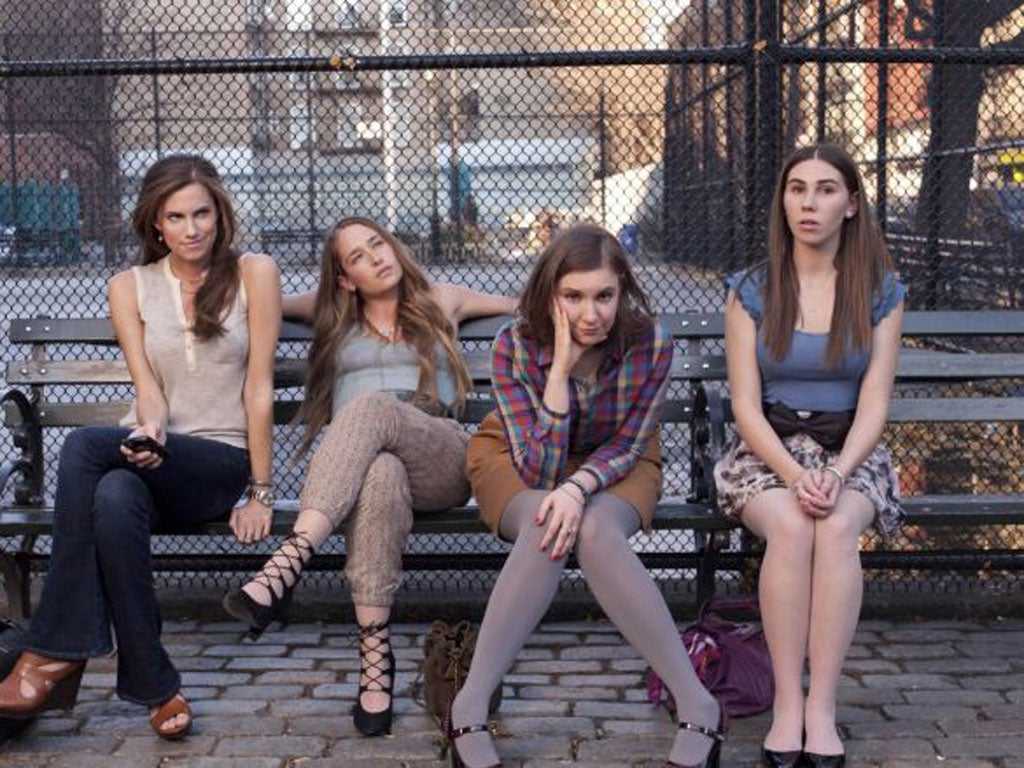First Night: Girls, Sky Atlantic, Mondays, 10pm
Forget Sex And The City, here come Lena Dunham's Girls

You might be tempted to describe a comedy written, directed and produced by its central character as a "vanity project". But from the very first frames of Girls, Lena Dunham's sharp, next-generation riposte to the gloss and fantasy of Sex and the City, it's obvious vanity cannot be calling the shots here.
Our first sight of Hannah – the character Dunham plays – isn't a flattering one; spaghetti dangles from her mouth and not just a single, fetching strand either but a gobful. Hannah isn't eating, she's at a trough. She's dining with her out-of-town parents at a Manhattan restaurant where she's about to learn that, after two years of subsidy, they're cutting off the money.
Hannah is outraged. "I could be a drug addict," she says indignantly. "Do you realise how lucky you are?" Seen from some angles our heroine is spoilt, solipsistic and self-deceiving. And Dunham knowingly doesn't close those angles off.
Like Sex And The City – acknowledged as a kind of distant forebear in an early scene – Girls centres on the lives of four New Yorkers coping with careers, self-realisation and relationships. Hannah is an aspiring writer coasting, till now, on the indulgence of her parents. Her best friend Marnie works in an art gallery and struggles with a growing impatience with her perfect boyfriend Charlie. And Shoshanna and Jessa are cousins, the first is ditzy, hare-brained and American, the latter British and self-regardingly hip (when Jessa confesses she's never seen Sex and the City, Shoshanna is appalled, saying: "Are you serious? That's like not being on Facebook." "I'm not on Facebook," Jessa replies, with languid condescension).
When it aired in the US, Girls generated a lot of what television executives like to call "noise", most of it approving, for the tartness of the writing, for its refusal of standard comic formulas and for what many saw as the unblushing realism of its depiction of young women's lives. But it also sparked a controversy because it contained no black characters – itself an inverted kind of compliment. Nobody really minds being left out of a turkey, after all – and Dunham's tongue-in-cheek acknowledgement that Girls might speak for a particular demographic ("I think that I may be the voice of my generation," Hannah tells her parents. "Or maybe a voice of a generation") effectively opened the door to the complaint that not everyone had had their say.
As for whether Girls offers a truthful account of young, white New York women, I'm not woman enough to pronounce on that. But I doubt any male writer would have dared to write anything as boldly indifferent to inter-gender niceties. Hannah's friends-with-benefits relationship with Adam, an out-of-work actor, delivered two of the most excruciatingly uncomfortable couplings I've seen on the small screen.
The final shot last night showed the star splayed on a gynaecologist's table, a disapproving doctor busy between her legs as Hannah stammered nonsense about Aids. Definitely not a vanity project then, but a lot for Dunham to be vain about.
Join our commenting forum
Join thought-provoking conversations, follow other Independent readers and see their replies
Comments
Bookmark popover
Removed from bookmarks